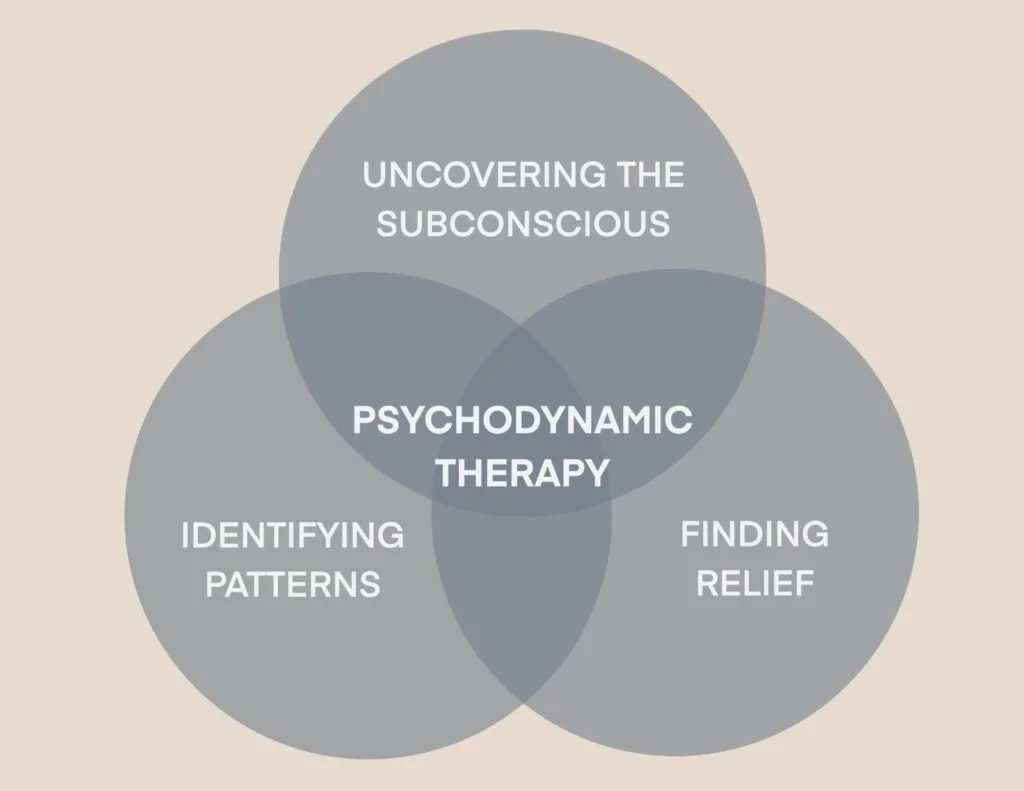Psychodynamic Therapy for Trauma in Connecticut: Understanding Healing Through Unconscious Exploration
Trauma affects millions of people worldwide, leaving lasting imprints on both mind and body. For residents of Connecticut seeking comprehensive trauma treatment, psychodynamic therapy offers a unique pathway to healing that explores the deeper, often unconscious aspects of trauma recovery. Whether you're searching for therapy in Newington, Connecticut, or throughout the greater Hartford area, this comprehensive guide examines how psychodynamic therapy works for trauma treatment and why it might be the right choice for your healing journey.
What Is Psychodynamic Therapy?
Psychodynamic therapy is a depth-oriented therapeutic approach that focuses on unconscious processes and how past experiences shape current behavior and relationships. Rooted in psychoanalytic theory, this therapy modality emphasizes the therapeutic relationship as a vehicle for healing and insight development.
Unlike some other trauma therapies that focus primarily on symptoms or specific techniques, psychodynamic therapy takes a holistic approach. It examines how traumatic experiences become integrated into one's personality structure and worldview, affecting everything from self-concept to relationship patterns.
How Psychodynamic Therapy Addresses Trauma
Exploring Unconscious Patterns
Trauma often creates unconscious defense mechanisms and behavioral patterns that persist long after the traumatic event. Psychodynamic therapy helps individuals recognize these patterns by examining:
Repetitive relationship dynamics that may mirror past traumatic experiences
Defense mechanisms developed to cope with overwhelming emotions
Unconscious beliefs about self, others, and the world formed during traumatic periods
Transference patterns that emerge in the therapeutic relationship
The Role of the Therapeutic Relationship
In psychodynamic therapy, the relationship between therapist and client becomes a powerful tool for healing. This relationship provides:
A safe space to explore difficult emotions and memories
An opportunity to experience healthy attachment and trust
A laboratory for understanding relationship patterns
A corrective emotional experience that can heal relational trauma
Processing Complex Emotions
Trauma often involves complex, contradictory emotions that can be difficult to process. Psychodynamic therapy creates space for exploring these nuanced emotional experiences without judgment, helping individuals:
Identify and name previously unconscious feelings
Understand the adaptive function of emotional responses
Develop greater emotional tolerance and regulation
Integrate split-off aspects of the traumatic experience
The elements of psychodynamic therapy
Benefits of Psychodynamic Therapy for Trauma Recovery
Deep, Lasting Change
Rather than focusing solely on symptom reduction, psychodynamic therapy aims for structural personality changes that create lasting resilience. Clients often experience:
Improved self-understanding and self-acceptance
Enhanced capacity for intimate relationships
Greater emotional flexibility and regulation
Reduced tendency toward self-destructive patterns
Addressing Root Causes
Psychodynamic therapy doesn't just treat trauma symptoms; it addresses the underlying psychological structures affected by trauma. This approach can be particularly beneficial for:
Complex trauma involving multiple traumatic experiences
Developmental trauma that occurred during formative years
Relational trauma involving betrayal or abuse by caregivers
Intergenerational trauma passed down through family systems
Personalized Treatment Approach
Each person's trauma experience is unique, and psychodynamic therapy adapts to individual needs rather than following a standardized protocol. This flexibility allows for:
Exploration of personal meaning-making around traumatic experiences
Attention to individual defense mechanisms and coping styles
Consideration of cultural and family background factors
Integration of spiritual or existential dimensions of healing
What to Expect in Psychodynamic Trauma Therapy
The Initial Phase
Early sessions typically focus on establishing safety and trust while beginning to explore current difficulties. Your therapist may:
Gather detailed personal and family history
Assess current symptoms and functioning
Begin identifying patterns in relationships and behaviors
Establish therapeutic boundaries and expectations
The Working-Through Phase
The middle phase of therapy involves deeper exploration of unconscious material and trauma-related patterns. This phase often includes:
Analysis of dreams, fantasies, and free associations
Exploration of transference and countertransference dynamics
Processing of traumatic memories as they emerge naturally
Development of insight into defensive patterns and their origins
Integration and Termination
The final phase focuses on integrating insights and preparing for therapy completion. This involves:
Consolidating gains and new self-understanding
Developing strategies for maintaining progress
Working through termination feelings and attachment issues
Planning for ongoing self-reflection and growth
Is Psychodynamic Therapy Right for Your Trauma?
Ideal Candidates
Psychodynamic therapy may be particularly beneficial for individuals who:
Desire deep self-understanding alongside symptom relief
Have complex or long-standing trauma histories
Experience relationship difficulties related to trauma
Feel ready to engage in intensive emotional exploration
Value the therapeutic relationship as part of healing
Considerations and Limitations
While highly effective for many, psychodynamic therapy may not be the first choice for everyone. Consider these factors:
Time commitment: This approach typically requires longer-term treatment
Emotional intensity: The process can be emotionally challenging at times
Stabilization needs: Individuals in crisis may need symptom-focused treatment first
Practical concerns: Cost and scheduling may be considerations for extended therapy
Finding Qualified Psychodynamic Therapy in Connecticut
Connecticut residents have access to numerous skilled trauma therapists trained in psychodynamic approaches. When seeking therapy in Connecticut, particularly in the Newington area, it's important to find therapists who specialize in trauma treatment and understand the local community resources available.
Searching for Therapy in Newington, Connecticut
Newington, Connecticut offers several advantages for trauma therapy seekers:
Proximity to Hartford's medical community with access to specialized mental health services
Small-town atmosphere that can feel safer for trauma survivors beginning their healing journey
Convenient location with easy access from surrounding Connecticut communities
Integration with broader Connecticut mental health networks for comprehensive care coordination
When looking for psychodynamic therapy in Newington, Connecticut, consider therapists who have:
Specialized training in psychodynamic approaches
Experience treating trauma and PTSD
Understanding of attachment theory and relational dynamics
Commitment to ongoing supervision and professional development
Cultural competence relevant to your background and experiences
Connecticut Resources for Trauma Recovery
Connecticut offers extensive mental health resources that can complement psychodynamic therapy for trauma. Local residents benefit from:
Connecticut's strong healthcare infrastructure supporting comprehensive trauma treatment
University-affiliated training programs that often provide high-quality services at reduced costs
Community mental health centers throughout Connecticut offering sliding-scale fees
Support groups and community resources specifically for trauma survivors
For those in Newington, Connecticut and surrounding areas, consider reaching out to local healthcare providers who can provide referrals to qualified psychodynamic therapists specializing in trauma treatment.
Combining Psychodynamic Therapy with Other Approaches
Many Connecticut therapists integrate psychodynamic therapy with other evidence-based trauma treatments. This comprehensive approach is particularly common in the Hartford and Newington, Connecticut area, where mental health professionals often collaborate to provide holistic care. Effective combinations include:
EMDR for processing specific traumatic memories
Somatic approaches for addressing body-based trauma responses
Group therapy for shared healing experiences
Mindfulness practices for present-moment awareness and regulation
The Science Behind Psychodynamic Therapy for Trauma
Research has increasingly supported the effectiveness of psychodynamic therapy for trauma treatment. Studies have shown:
Significant improvements in PTSD symptoms that are maintained long-term
Enhanced emotional regulation and interpersonal functioning
Neurological changes consistent with trauma recovery
Comparable or superior outcomes to other evidence-based treatments
These findings validate what many trauma survivors have experienced: that deep, relationship-based healing can create profound and lasting change.
Beginning Your Healing Journey in Connecticut
Trauma recovery is a courageous journey that requires patience, commitment, and the right therapeutic support. For Connecticut residents, particularly those in the Newington area, psychodynamic therapy offers a path to not just symptom relief, but fundamental healing that can transform your relationship with yourself and others.
If you're considering psychodynamic therapy for trauma in Connecticut, take time to research qualified therapists in your area and don't hesitate to ask questions about their approach and experience. Whether you're seeking therapy in Newington, Connecticut, or elsewhere in the state, the right therapeutic relationship can be transformative, offering hope and healing even for the deepest wounds.
Connecticut's mental health community is known for its collaborative approach and high standards of care. Many therapists in the Hartford and Newington areas work closely with other healthcare providers to ensure comprehensive treatment that addresses all aspects of trauma recovery.
Remember that seeking help is a sign of strength, not weakness. With the right support and your commitment to the process, healing from trauma is not only possible but can lead to greater wholeness and resilience than you may have thought possible.
If you are interested in starting psychodynamic therapy, give Stages of Healing a call. Shelby Davis, LPC, RDT, uses a psychodynamic framework to her work with clients, and can help you find the trauma relief you are looking for. To get started, use the contact form above to schedule a consult call.
Stages of Healing office in Newington, CT.
If you're experiencing trauma symptoms or considering therapy, please consult with a qualified mental health professional. This article is for informational purposes and should not replace professional medical or psychological advice.


